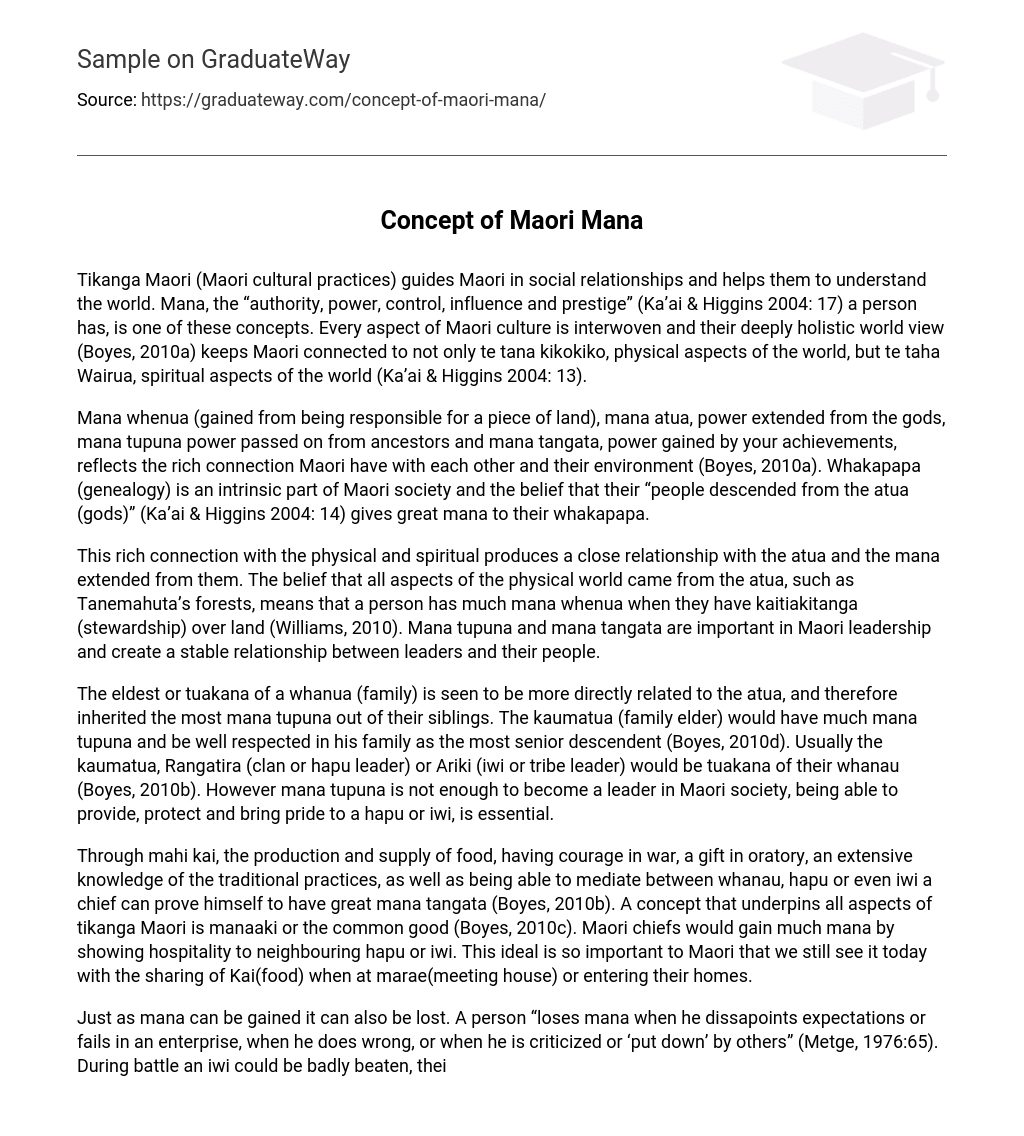Tikanga Māori (Māori cultural practices) guide Māori in social relationships and help them to understand the world. Mana, the “authority, power, control, influence, and prestige” (Ka’ai & Higgins 2004:17) a person has, is one of these concepts. Every aspect of Māori culture is interwoven, and their deeply holistic worldview (Boyes, 2010a) keeps Māori connected not only to the tāngata Kiko Kiko (physical aspects of the world) but also to te taha wairua (spiritual aspects of the world) (Ka’ai & Higgins 2004:13).
Mana whenua (gained from being responsible for a piece of land), mana atua (power extended from the gods), mana tūpuna (power passed on from ancestors), and mana tangata (power gained by one’s achievements) reflect the rich connection Māori have with each other and their environment (Boyes, 2010a). Whakapapa (genealogy) is an intrinsic part of Māori society, and the belief that “their people descended from the atua (gods)” (Ka’ai & Higgins 2004:14) gives great mana to their whakapapa.
This rich connection with the physical and spiritual produces a close relationship with the atua and the mana extended from them. The belief that all aspects of the physical world came from the atua, such as Tānemahuta’s forests, means that a person has much mana whenua when they have kaitiakitanga (stewardship) over land (Williams, 2010). Mana tūpuna and mana tangata are important in Māori leadership and create a stable relationship between leaders and their people.
The eldest or tuakana of a whānau (family) is seen to be more directly related to the atua and therefore inherits the most mana tūpuna out of their siblings. The kaumatua (family elder) would have much mana tūpuna and be well-respected in their family as the most senior descendant (Boyes, 2010d). Usually, the kaumatua, Rangatira (clan or hapū leader), or Ariki (iwi or tribe leader) would be tuakana of their whānau (Boyes, 2010b). However, mana tūpuna is not enough to become a leader in Māori society; being able to provide, protect, and bring pride to a hapū or iwi is essential.
Through mahi kai, the production, and supply of food, having courage in war, a gift in oratory, extensive knowledge of traditional practices, as well as being able to mediate between whānau, hapū, or even iwi, a chief can prove themselves to have great mana tangata (Boyes, 2010b). A concept that underpins all aspects of Tikanga Māori is manaaki or the common good (Boyes, 2010c). Māori chiefs would gain much mana by showing hospitality to neighboring hapū or iwi. This ideal is so important to Māori that we still see it today with the sharing of kai (food) when at the marae (meeting house) or entering their homes.
Just as mana can be gained, it can also be lost. A person “loses mana when he disappoints expectations or fails in an enterprise, when he does wrong, or when he is criticized or ‘put down’ by others” (Metge, 1976: 65). During the battle, an iwi could be badly beaten, and their warriors would lose mana. The dead were often hidden before being buried to protect the mana of that person and their whanau if warring with a neighboring hapu or iwi. Enemies would come and get utu (revenge) on the dead by eating their flesh, in doing so taking away their mana (Boyes, 2010c).
When a person’s mana is threatened, they can fight to rebuild it by excelling at important tasks or going after the person who took their mana. Mana atua shows how tapu (sacred) leadership is. The conduct of a Maori community shows that the rangatira, who has both mana tupuna and mana tangata, is respected and has clear control. This respect is not gained through fear, but by the mana that the leader has both inherited and achieved. It could be thought that traditional leadership and the mana needed is no longer relevant in contemporary Aotearoa.
However, countless Maori leaders of today show the mana tangata traditional Maori chiefs needed to serve their people (Boyes, 2010b). To be a Maori leader today, you must show many qualities, including strategizing and planning for the future well-being of the people they manage, an ability in te reo (the language) and Tikanga Maori, good negotiation and facilitation skills, active participation in the Maori world, being a role model, and having effective communication (Boyes, 2010b). All of these qualities describe a person with great mana who can really work for the collective.
Professor Sir Mason Durie of Rangitane & Ngati Kauwhata is a contemporary Maori leader who shows much mana tangata. He is DVC & AVC at Massey University and has contributed much to Maori health programs as well as being a world leader in Indigenous Development & Health (Boyes, 2010b). His ability to show manaaki and his numerous achievements prove he has great mana. The mana of a person is measured by many things, the land they hold, their ancestors before them, and the feats they have achieved. Most importantly, mana is assessed by those around you and the people you are working to aid.





